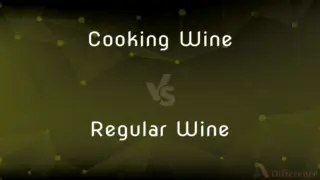Head Chef vs. Executive Chef — What's the Difference?
Edited by Tayyaba Rehman — By Fiza Rafique — Published on November 25, 2023
The Head Chef oversees kitchen operations and staff, whereas the Executive Chef manages multiple kitchens or the entire culinary direction of an establishment.

Difference Between Head Chef and Executive Chef
Table of Contents
ADVERTISEMENT
Key Differences
In the culinary world, both the Head Chef and Executive Chef play crucial roles. However, their responsibilities and the scope of their roles differ. The Head Chef, also known as the Chef de Cuisine, primarily manages the day-to-day operations of a single kitchen. Their focus often lies in ensuring that dishes are prepared correctly, maintaining quality, and directly supervising kitchen staff.
On the other hand, the Executive Chef generally holds a more strategic role, especially in larger establishments or chains. They are responsible for setting the culinary direction, creating menus, and might oversee multiple kitchens or venues. The Executive Chef often collaborates with other departments, such as marketing and finance, aligning the culinary vision with business objectives.
It's important to understand that while the Head Chef might be the highest authority in a single kitchen, the Executive Chef typically has a broader oversight, including hiring senior kitchen staff, budgeting, and strategic planning. They may not be as involved in the daily operations as a Head Chef but play a pivotal role in ensuring consistency across different outlets or branches.
Additionally, the path to becoming an Executive Chef usually involves first being a Head Chef. This means that an Executive Chef would have had experience managing kitchen operations before progressing to a more strategic role. In essence, while both roles require culinary expertise, the Head Chef leans more towards operational management and the Executive Chef towards overall strategic culinary leadership.
Comparison Chart
Role Focus
Day-to-day kitchen operations
Overall culinary strategy of establishment
ADVERTISEMENT
Scope
Single kitchen
Multiple kitchens or entire establishment
Interaction
Directly supervises kitchen staff
Collaborates with other departments
Experience Path
Can become a Head Chef with years of kitchen experience
Usually progresses from Head Chef or similar roles
Menu Involvement
May contribute to menu items
Often responsible for creating and approving menus
Compare with Definitions
Head Chef
Often reports to the Executive Chef.
The Head Chef presented the new menu ideas to the Executive Chef.
Executive Chef
Plays a strategic role in culinary decisions.
Under the Executive Chef's vision, the restaurant earned a Michelin star.
Head Chef
The primary leader of a kitchen.
The Head Chef ensures every dish meets the restaurant's standards.
Executive Chef
Overarches multiple kitchens or an establishment's culinary direction.
The Executive Chef plans menus for all the hotel's restaurants.
Head Chef
Manages the daily operations of the kitchen.
The Head Chef rearranged the kitchen for better efficiency.
Executive Chef
Might not be involved in daily kitchen operations.
The Executive Chef attended the food conference, leaving daily tasks to the Head Chef.
Head Chef
Ensures the quality and consistency of dishes.
The Head Chef tasted each sauce to ensure perfection.
Executive Chef
Ensures consistency across various outlets.
With the Executive Chef's guidelines, all chain restaurants maintained uniform quality.
Head Chef
Responsible for supervising kitchen staff.
Under the Head Chef's guidance, the kitchen runs smoothly.
Executive Chef
Manages budgets and collaborates with other departments.
The Executive Chef worked with finance to optimize food costs.
Common Curiosities
Who directly manages the kitchen staff?
The Head Chef directly manages the kitchen staff.
Does the Executive Chef handle daily kitchen tasks?
Not typically, as the Executive Chef focuses on overall strategy, leaving daily operations to the Head Chef.
What's the usual career progression to become an Executive Chef?
Often, chefs start in lower kitchen roles, progress to Head Chef, and then move on to become an Executive Chef.
Do Head Chefs need formal culinary education?
While beneficial, many Head Chefs rise through ranks based on experience, skill, and reputation.
Who creates the menus in a restaurant?
While the Head Chef might contribute, the Executive Chef usually has the final say in menu creation.
Who ensures the consistency of dishes in a single kitchen?
The Head Chef ensures the consistency and quality of dishes in a single kitchen.
In a large hotel with multiple restaurants, who oversees all culinary operations?
The Executive Chef oversees all culinary operations in such establishments.
Can a Head Chef work without an Executive Chef?
Yes, smaller establishments might only have a Head Chef overseeing the kitchen.
Who handles the hiring of senior kitchen staff?
The Executive Chef typically handles hiring senior kitchen staff.
Does the Executive Chef decide food pricing?
They often collaborate with finance and management to determine food pricing.
Share Your Discovery

Previous Comparison
Cooking Wine vs. Regular Wine
Next Comparison
My Friend vs. Friend of MineAuthor Spotlight
Written by
Fiza RafiqueFiza Rafique is a skilled content writer at AskDifference.com, where she meticulously refines and enhances written pieces. Drawing from her vast editorial expertise, Fiza ensures clarity, accuracy, and precision in every article. Passionate about language, she continually seeks to elevate the quality of content for readers worldwide.
Edited by
Tayyaba RehmanTayyaba Rehman is a distinguished writer, currently serving as a primary contributor to askdifference.com. As a researcher in semantics and etymology, Tayyaba's passion for the complexity of languages and their distinctions has found a perfect home on the platform. Tayyaba delves into the intricacies of language, distinguishing between commonly confused words and phrases, thereby providing clarity for readers worldwide.













































